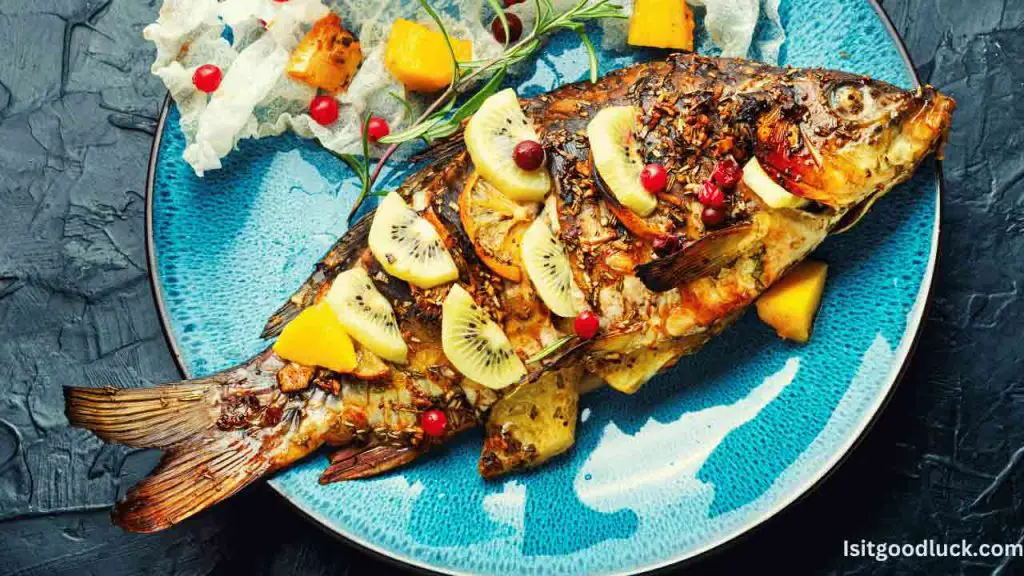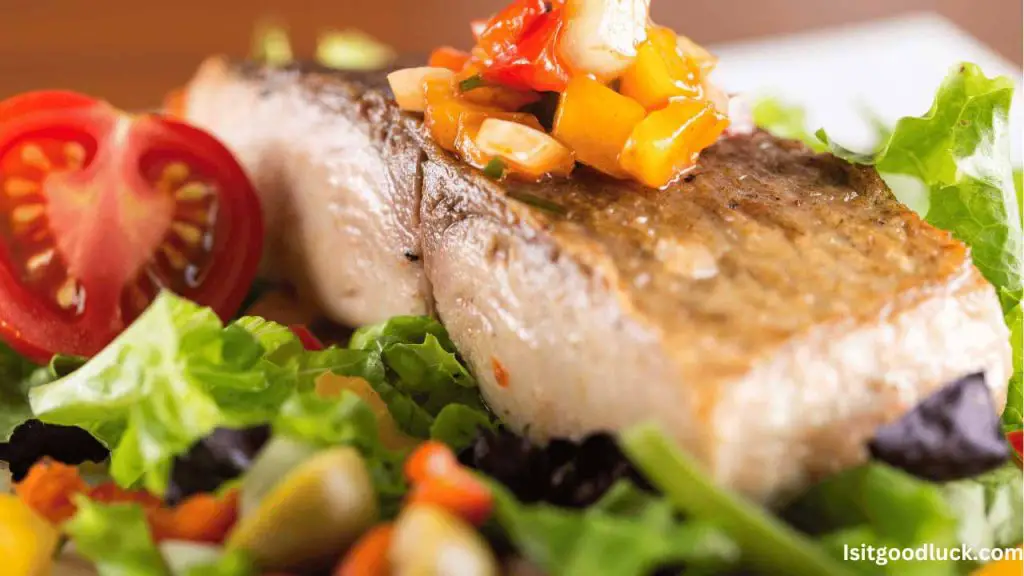As the fireworks light up the midnight sky and the calendar flips to a brand new year, millions around the globe are diving into a sumptuous feast, ringing in the new year with delightful dishes rich in symbolism and tradition.
But, there’s one dish that swims to the top on many menus worldwide—fish. Welcome to our latest blog post: “Is it good luck to eat fish on New Year’s?”
We’re about to embark on an enthralling journey beneath the waves of tradition, superstition, and culture, exploring why this humble yet fascinating aquatic creature is often served as the clock strikes twelve.
Whether you’re a curious foodie, a New Year’s enthusiast, or a hardcore ichthyophile—yes, that’s a person who loves fish!—this post promises to be quite the catch.
So, sit tight and get ready to dive into the shimmering depths of this new year tradition. Let’s see if it truly is a matter of good fortune to feast on fish when bidding farewell to the old and welcoming the new!
Contents
- 1 The History and Origins of the Tradition
- 2 The Symbolism of Fish in Different Cultures
- 3 Fish in New Year’s Celebrations Around the World
- 4 Is it Good Luck to Eat Fish on New Year’s?
- 5 Scientific Backing on this superstition:
- 6 Recipes to Try with Fish on New Year:
- 7 Conclusion:
- 8 FAQs
- 8.1 Why is eating fish on New Year’s Eve a tradition?
- 8.2 What type of fish is traditionally eaten on New Year’s?
- 8.3 Are vegetarian or vegan alternatives to the New Year’s fish tradition?
- 8.4 Does eating fish on New Year’s guarantee good luck for the year?
- 8.5 Does science support the notion of fish bringing good luck for the New Year?
The History and Origins of the Tradition
The tale of our piscine protagonist begins with a splash, rooted deeply in the annals of time and culture. Have you ever wondered why a dish as simple as fish has managed to swim through generations and into our New Year’s feasts? Well, it’s time to buckle up and dive back into history!
The tradition of consuming fish at the turn of the year traces its origins to various corners of the world, each with its unique spin on the custom. For instance, in certain parts of Europe during the Middle Ages, the Catholic Church’s rules prohibited meat consumption on religious observances, including New Year’s Eve.
Fish, therefore, emerged as a popular and permissible alternative, gradually weaving itself into the fabric of the celebration.
Travel further East, and you’ll stumble upon the rich cultural tapestry of China and Japan. Here, fish, specifically carp, was prized for its determination and strength, symbolizing overcoming adversity and forging ahead—exactly the sentiments one would want to ring in a new year with.

The word for fish in Mandarin, ‘Yu,’ even carries a second meaning – ‘surplus,’ fitting perfectly with the desire for prosperity and abundance in the coming year.
Crossing the vast seas and continents to North America, particularly in regions with a strong maritime culture, fish was plentiful and became a key feature of hearty New Year feasts. The tradition was less about superstition here than celebrating the sea’s bounties.
As these customs sailed through the waters of time, they were passed down from one generation to the next, adapting and evolving with changing cultures and societies. Today, they’ve morphed into the diverse set of traditions we observe around the globe.
Through a millennium-long journey, the humble fish has swum into our New Year traditions and continues to be a cherished part of our celebrations as we bid farewell to the old and dive into the new.
The Symbolism of Fish in Different Cultures
As we journey through the world’s cultures, we find the fish has been hooked with powerful symbols and meanings beyond being a delicious entrée. In the vast ocean of symbols, fish often emerge as harbingers of prosperity, luck, and abundance. Let’s take a fascinating trip across the globe and explore the depths of these beliefs.
First, let’s swim over to China. In Chinese culture, fish, or “Yu,” symbolizes fortune and good vibes. It shares pronunciation with the word for “surplus” or “abundance.” During Chinese New Year celebrations, serving a whole fish is a wish for a surplus in the coming year, extending the sentiment, “May you have fish every year.”
We then navigate to Japan, where the scales tip towards ‘koi’ or carp. With its spirited tenacity, this fish is seen as a symbol of perseverance and determination. Japanese folklore speaks of a koi that swam upstream and leaped over a waterfall to become a dragon, encapsulating the idea of overcoming adversity—a hopeful way to welcome a new year!
In Jewish culture, fish also play a promising role. Considered a symbol of fertility and abundance, they often grace the Rosh Hashanah table (Jewish New Year) as a wish for a year filled with growth and increase.
Across the pond in Nordic countries, herring, often pickled, is traditionally eaten at the stroke of midnight, symbolizing the hope for a bountiful catch in the coming year. The silver sheen of the herring is also associated with the coinage, further linking the fish to prosperity and wealth.
The symbolism of fish in these varied cultures, from China’s surplus to Nordic prosperity, highlights why this aquatic creature has become a New Year’s staple, swimming with the currents of luck, abundance, and prosperity.
There’s a universal agreement amongst these cultures that beginning the year with fish on the table could set the tide for a fortunate year ahead!
Fish in New Year’s Celebrations Around the World
As the calendar page flips to a fresh new year, the world comes alive with glittering fireworks, jingling bells, and celebratory cheers. Amidst this cacophony of joyous sounds, the gentle sizzle of fish cooking is a common harmony in kitchens worldwide.
Each region and culture adds a unique flavor and twist to the tradition of welcoming the year with fish. Let’s embark on a gastronomic tour around the globe to explore some of these unique customs and dishes.
In the Land of the Rising Sun, Japan, ‘osechi ryori’ is the traditional meal enjoyed on New Year’s Day. Among the colorful foods, ‘tazukuri,’ candied sardines, is a favorite. These tiny fish, once used as fertilizer in rice fields, symbolize a bountiful harvest for the year ahead.
Herring is the New Year’s Eve menu star traveling westwards to Germany. A bite of pickled herring as the clock strikes midnight is said to ensure a year of good luck. Moreover, it’s also customary to gift loved ones with a jar of pickled herring, symbolizing wishes for abundance in the new year.
Over in the Baltic states like Lithuania and Latvia, herring plays a starring role, too, albeit in a different avatar. Herring is traditionally served in a coat of delicious sauces, ranging from sour cream to tomato or mustard, promising a tasty start to the year.
Across the Atlantic, in parts of the United States, particularly the southern region, tradition calls for a New Year’s Day meal featuring ‘Hoppin’ John,’ a hearty dish made from black-eyed peas and often served with fish. The dish is a nod to the bountiful coastal catch and is believed to bring prosperity.
In Denmark, ‘karrysild,’ a curried herring dish served on rye bread, is customary at the New Year’s lunch table. This deliciously spiced herring symbolizes hope for abundance in the coming year.
From the spiced herring of Denmark to the candied sardines of Japan, the tradition of consuming fish to ring in the New Year is universal and unique, tied together by the common thread of prosperity and abundance.
As diverse as these customs are, they all share a similar hope: to embark on the new year’s journey with a promise of good fortune, one delicious fish dish at a time!

Is it Good Luck to Eat Fish on New Year’s?
As the countdown to the New Year begins, the world collectively holds its breath, ready to usher in a fresh start. Brimming with anticipation, excitement, and hope, this pivotal moment often finds a delightful accomplice in a well-loved aquatic guest – the fish.
But why, you may ask, does this seemingly ordinary creature take center stage at this extraordinary time? Is it good luck to dine on fish as we ring in the New Year?
The answer lies in a fascinating net of history, culture, and symbolism. In many cultures across the globe, the fish isn’t merely a gastronomical delight; it’s a symbol steeped in powerful meanings.
Its ability to swim forward, overcoming currents and tides, represents the indomitable human spirit of perseverance. Its multitude signifies abundance and fertility, echoing our hopes for a plentiful and prosperous year ahead.
However, the question of whether fish truly brings good luck is more of a subjective one, interwoven with personal beliefs and cultural values. After all, luck can often be a matter of perception.
For some, starting the year with the taste of a beloved, traditional dish might bring comfort and positivity, thereby feeling ‘lucky.’ For others, adhering to cultural traditions and customs might serve as a link to their roots and heritage, instilling a sense of optimism for the year to come.
Whether you find yourself savoring pickled herring in Germany, enjoying tazukuri in Japan, or tucking into a hearty fish fry in the American South, the practice of eating fish on New Year’s is less about its luck-bringing abilities and more about embracing a time-honored tradition that symbolizes hope, abundance, and continuity.
As the old saying goes, we make our luck – and if a delicious fish dish helps to set a positive tone for the year, then why not dive right in?
Scientific Backing on this superstition:
As our exploration continues, we might wonder if there’s a hidden science behind these age-old traditions. Can savoring a mouthful of fish at midnight attract a wave of good luck? Or are we simply casting our nets into a sea of superstitions?
Let’s be clear upfront: science has yet to discover a direct connection between feasting on fish and landing a bounty of good luck. The association between the two is largely symbolic and cultural, passed down through generations and cherished for its historic and emotional resonance.
So, while we can’t scientifically claim that fish are a luck magnet, an angle worth exploring is the notable health benefits of consuming fish.
Fish are a rich source of essential nutrients, including high-quality protein, iodine, and various vitamins and minerals. They’re particularly lauded for their omega-3 fatty acids, which boost heart and brain health.
Including fish in your New Year’s meal could kick-start a cycle of healthy eating habits, contributing to overall well-being throughout the year. In that sense, one could argue it’s a “lucky” choice to begin the year!
Furthermore, some scientific studies have shown a link between a balanced diet, which includes fish, and improved mood and mental health. Starting the year on a positive note, both physically and mentally, might just tip the scales in favor of a prosperous year!
While the “luck” attributed to eating fish on New Year’s doesn’t have scientific backing in the conventional sense, the health benefits associated with fish consumption might contribute to a fortunate start to your year. Here’s to diving into a healthy, prosperous New Year with our favorite aquatic ally by our side!
Recipes to Try with Fish on New Year:
Now that we’ve navigated the fascinating currents of history, symbolism, and science tied to our tradition of fish for New Year’s, it’s time to dive into the real fun—cooking! Whether you’re a seasoned home chef or a novice looking to experiment, these delectable fish recipes will add flavor to your New Year’s feast, catering to various tastes and dietary requirements.
- Classic Grilled Salmon (Gluten-Free): This is elegant yet straightforward. Marinate a fresh salmon fillet in lemon juice, olive oil, garlic, and a sprinkle of dill, then grill it to perfection. Pair it with a vibrant salad or roasted vegetables, and you have a heart-healthy and gluten-free dish to start the year.
- Tazukuri (Candied Sardines): This traditional Japanese New Year dish is delicious and carries rich cultural significance. Tazukuri involves simmering sardines in a sweet-soy reduction until they are caramelized and crunchy. It’s a beautiful blend of sweet, savory, and umami flavors and a unique dish to introduce to your New Year’s table.
- Vegetarian Fish and Chips (Vegetarian-Friendly): You read that right! Using halloumi cheese as a stand-in for the fish, this recipe takes the British classic and gives it a vegetarian-friendly twist. The halloumi is coated in a crispy, golden batter and served with chunky chips. It’s a fun and inclusive way to keep with the fish tradition without the actual fish.
- Pickled Herring Salad (Dairy-Free): A nod to German and Scandinavian customs, this salad is a refreshing blend of flavors. It combines pickled herring, tart apples, fresh dill, and crisp onions. It’s a dairy-free dish that will delight those who enjoy bold and tangy flavors.
- Vegan “Fish” Tacos (Vegan): Using battered and fried avocado slices as a substitute for fish, these vegan tacos are a fantastic addition to any New Year’s feast. Top them with a tangy slaw and a drizzle of creamy vegan mayo for a dish everyone at your celebration can enjoy!
These recipes offer a delightful blend of tradition and innovation, ensuring everyone can partake in the New Year’s fish tradition. Remember, cooking should be an enjoyable experience. Have fun with it, make it your own, and here’s to a delicious start to the New Year!
Conclusion:
Our culinary expedition through time and across cultures has led us through the fascinating tale of why fish graces our tables as we bid farewell to one year and welcome another.
The tradition of eating fish on New Year’s, steeped in symbolism and history, is a testament to the shared human desire for prosperity, abundance, and a dash of good luck as we plunge into a fresh calendar year.
While we haven’t discovered a magic formula proving that consuming fish will guarantee a lucky year, the tradition holds its charm. It brings a sense of continuity, linking us with generations past and a vibrant sense of community as we find shared customs across different cultures.
Beyond symbolism, consuming fish has undeniable health benefits, making it a wholesome choice to kickstart the year. Whether we crunch on candied sardines in Japan, delight in grilled salmon in the United States, or explore vegetarian fish alternatives, the tradition is truly a global affair.
Ultimately, is it good luck to eat fish on New Year’s? The answer is as diverse as the sea itself. But one thing remains certain: welcoming the New Year with a time-honored tradition and a delicious meal can only set a positive and hopeful tone.
So, let’s welcome the New Year with open hearts, shared joys, and a plateful of fish (or its alternative) steeped in the flavors of luck, abundance, and prosperity!
Also read other articles regarding new year’s good luck.
FAQs
Why is eating fish on New Year’s Eve a tradition?
The tradition of eating fish on New Year’s Eve is rooted in various cultural and historical practices. In some cultures, the fish’s ability to swim forward despite currents symbolizes perseverance and progress into the New Year. In others, fish is associated with fertility and abundance, making it a promising food to start the year.
What type of fish is traditionally eaten on New Year’s?
The type of fish eaten on New Year’s varies greatly by region and culture. In Japan, people traditionally enjoy ‘tazukuri,’ a dish made with candied sardines. In Germany and the Baltic states, herring is a common choice. In many parts of the United States, particularly in the South, a variety of fish may be enjoyed depending on local availability and tradition.
Are vegetarian or vegan alternatives to the New Year’s fish tradition?
Absolutely! Many innovative recipes use plant-based ingredients to simulate the experience of eating fish. For example, battered and fried avocado slices can be used as a substitute for fish in tacos, and halloumi cheese can mimic the texture of fish in a vegetarian-friendly version of fish and chips.
Does eating fish on New Year’s guarantee good luck for the year?
While the tradition of eating fish on New Year’s is seen as a symbol of good luck and prosperity in many cultures, it’s not a guarantee of good luck in the literal sense. “luck” can be subjective and varies from person to person. For many, adhering to a cherished tradition and starting the year positively can indeed feel lucky.
Does science support the notion of fish bringing good luck for the New Year?
There’s no scientific evidence to suggest that eating fish can bring good luck in the sense of influencing events or circumstances in your favor. However, fish are a good source of protein and omega-3 fatty acids, which are known to promote heart and brain health. Starting the year with a healthy meal could set the stage for good habits and health in the coming year, which some might interpret as a form of “good luck.”





